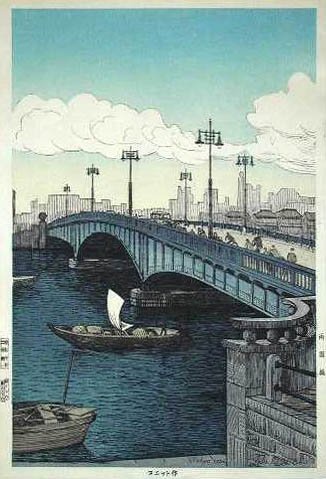 Image 1 of
Image 1 of

<b>RYOGOKU BRIDGE</b> / Noel Nouet1936<b>SOLD</b></em>
ARTIST: Noel Nouët, (1885-1969)
TITLE: Ryogoku Bridge
SERIES: Scenes of Tokyo,Twenty-four Views
PUBLISHER: Doi
MEDIUM: Woodblock
DATE: 1936
DIMENSIONS: 15 1/2 x 10 1/2 inches
CONDITION: No condition problems to note
LITERATURE: Nouët, Tokyo: Fifty Sketches, 1946
ARTIST: Noel Nouët, (1885-1969)
TITLE: Ryogoku Bridge
SERIES: Scenes of Tokyo,Twenty-four Views
PUBLISHER: Doi
MEDIUM: Woodblock
DATE: 1936
DIMENSIONS: 15 1/2 x 10 1/2 inches
CONDITION: No condition problems to note
LITERATURE: Nouët, Tokyo: Fifty Sketches, 1946
ARTIST: Noel Nouët, (1885-1969)
TITLE: Ryogoku Bridge
SERIES: Scenes of Tokyo,Twenty-four Views
PUBLISHER: Doi
MEDIUM: Woodblock
DATE: 1936
DIMENSIONS: 15 1/2 x 10 1/2 inches
CONDITION: No condition problems to note
LITERATURE: Nouët, Tokyo: Fifty Sketches, 1946
Details
We have a charming bridge scene reminiscent of Hiroshige’s Sudden Shower Over Ohashi Bridge, 1857. The scene is familiar until we look closely, as it provides a vantage point for Tokyo’s transition into modernity. One can almost feel the winds of change carry the clouds over a budding skyline, clad with sky-scrapers, while down below automobiles race past a hurried workforce as the newly installed electric streetlights prepare to light. The scene is presented to us by the Frenchman, Noel Nouët, no stranger to the modern conveniences of city life. Perhaps this is why the design is so self-assured and comfortable with the changes. This design successfully straddles East and West as well as old Japan and the relatively quick modernization it experienced.
Connoisseur's Note
This is an exceedingly early impression that demonstrates a strong wood grain pattern in the sky. This pattern is a desired effect, planed by the artist and printer to create a subtle atmospheric quality. Later impressions lack this effect, have a lighter coloration to compensate for the loss of the wood grain pattern, and bear Doi seals in the margins, as seen in the example below. This is a rare opportunity to acquire a scarcely available print in its earliest possible state.




